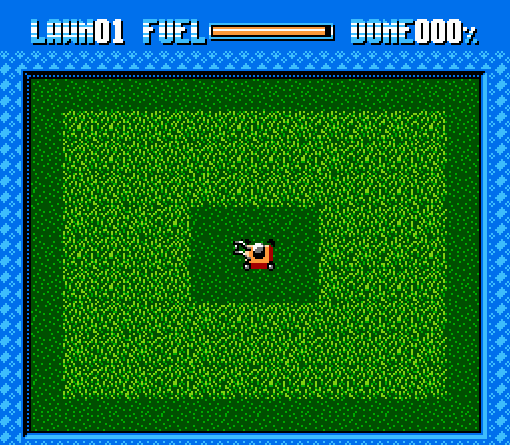14 minutes
Web Scraping for ROM Hacking Preservation

Update (20210927): RHDN has made it quite clear that the work discussed in this post has had a negative financial impact on their daily operations. Thus, even though I am proud of what I managed to accomplish given my skills, I cannot continue working on this project in good conscience. I hope that in time the RHDN community will see what other outsiders saw in this project: an attempt at transparency and preservation in the rom hacking world.
It is bittersweet to read words in public like “what a dumbass” and “How does a webscraper take 8 months to make?” (hint: look at the commits for proof that it didn’t). I wish I could find a way to discuss this work with the community without adding fuel to the fire. Oh well, I’ll get over it as I move on to other projects. This has been a great learning experience overall.
You might have never heard about it, but romhacking.net (or RHDN, for short) is a treasured website in the retro gaming community, and has been for quite some time. The website serves essentially as a global repository for ROM hacks, and is home to a wildly interesting community. While it is not the first of its kind, it is among the oldest surviving repository of its type, and by far has the most content compared to any competitor.
What is ROM hacking?
The acronym “ROM” stands for Read-Only Memory. In the emulation community, a ROM is the file containing all the assets and instructions necessary for a game console to run a video game. The size of ROM files can vary wildly, from a few kilobytes to many megabytes. For example, the size of the Super Mario Bros. ROM is 30.1 KB.
In its essence, ROM hacking is the action of modifying a ROM to change its behavior. It can be used to fix glitches, modify assets, introduce new enemy behavior, etc. Some ROM hacks use the core engine of a game to create completely new adventures, or even new games entirely. The most popular platform to perform ROM hacks is by far the Nintendo Entertainment System (NES), which hits the sweet spot in terms of ROM size and popularity among gamers. One of my favorite ROM hacks is a simple one: it removes the friendly fire in Battletoads for the NES. It removes the one major flaw from an otherwise brilliant game and gives it the polish it deserved.
Fun fact, a device called the Game Genie was made to essentially allow creating primitive ROM hacks on the fly. It would be connected as a middle-man between the game cartridge and the game console. Upon booting, the user would input 8 character “codes” that would modify specific memory sectors in the ROM sent to the game console. While it was very primitive, it was somewhat revolutionary because it allowed players to “create” ROM hacks on the fly that allowed new features such as infinite lives and level selection even if these cheats were never intended by the original game developers.
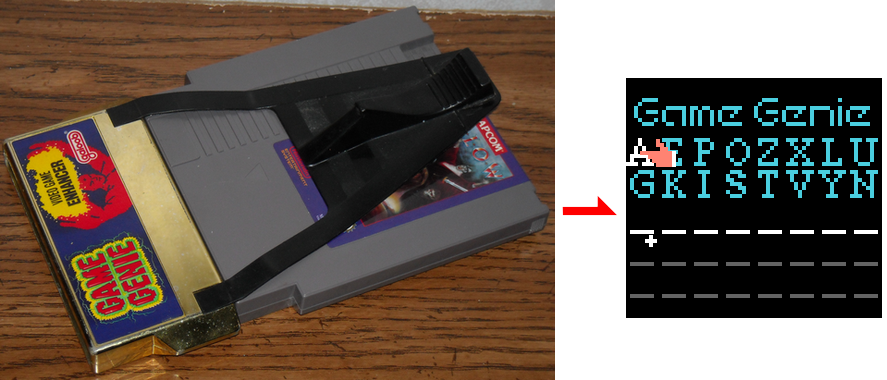
For ROM hacks that need more than three memory sectors to be modified, more sophisticated tools are required. Indeed, ROMs are extracted from the original game cartridge and are edited with tools such as HEX editors to give hackers as much freedom as they need.

Here is the part that boggles my mind when I think about ROM hacks: all of this is done without access to the source code. The people who attempt these hacks are essentially flying blind, and have to reverse engineer the core functionalities of games by looking at how the memory is being accessed and modified by the console in real time. Tools such as emulators ease the pain a bit, but this remains nonetheless incredibly impressive. And you can probably assume that the bigger the ROM, the more complex it is to modify. I think I remember a quote that said “ROM hacking is like trying to build a tower out of potato chips with atomic bombs as hands”.
With this basic explanation, you’d think that ROM hacks are rare and basic. Indeed, who has the time to dig into a spaghetti of HEX codes to create a “game” that cannot be sold? In reality, the truth may surprise you. RHDN already contains 10,000 hacks, translations and homebrew games in its curated database, and it keeps growing every day.
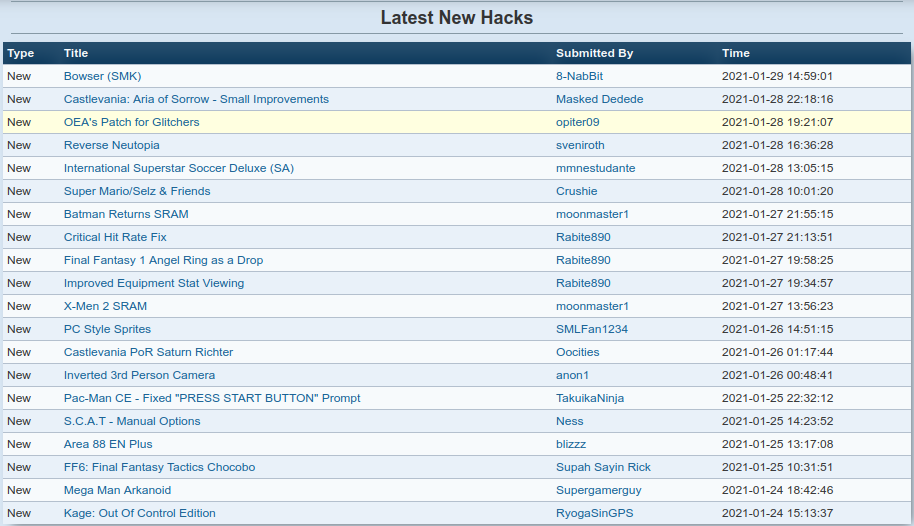
Now for a sad realization: there is little money to make in ROM hacks. This means that all the legwork of making ROM hacks and maintaining them is mostly handled by enthusiasts like you and me. As was proven time and time again, these little works of art will probably never be supported by companies such as Nintendo, even though the quality of some ROM hacks and translations rivals some of their own products. The greatest example of this is the English translation for the game Mother 3. This game has been requested by die-hard fans of the Mother series of RPG to be officially released in the Western hemisphere, but Nintendo never made it happen. In the end, some devoted fans took it upon themselves to translate the game in their own spare time to allow more people to get into the third instalment of the franchise. The result has to be seen to be believed: you could never tell that this work was made by unpaid fans. Even more impressive, their love for the game is such that they officially gave Nintendo their blessing to use their translation work in part or in full if it would allow the game to get an official release. But instead of embracing it, Nintendo shunned all these efforts.
There is hope, though. Recently, a Japanese company known as M2 has assembled an impressive crew of ROM hackers and has released updated (hacked) versions of games from the back-catalog of companies such as Nintendo, Sega, Namco and even Compile. The momentum is headed in the right direction, but so far this is one of the rare cases where ROM hacks have been officially licensed.
Why ROM hacking is so niche
The biggest pain associated with using ROM hacks is the fact that you have to assemble them yourself. If ROM
hackers released their final product as is, it would be seen as piracy, since it contains parts of the
original compiled code from the original version of the game. Therefore, when you download a ROM hack, the
file you download is usually a *.ips file (though this can vary).
This type of file simply lists the difference between the base ROM and the final hacked version. These differences are perfectly OK to share. But it creates a new problem: this means you have to “patch” the base ROM yourself to end up with the final product.
The process is easy enough. Download a utility such as Floating IPS (Flips), and then for every hack you want to use:
- Find the matching source ROM
- Apply your patch with Flips
- Output the hack as a new file

The hardest part is finding the matching source ROM (usually by finding the ROM with the matching MD5 sum). This is because some games could have multiple variants, and sometimes even the same variant might have been extracted by different means (resulting in slightly different ROMs). This tedious process is very hard to automate and people are still trying to figure out a way to tackle this challenge. To allow ROM hacks to make it in the mainstream, the patching process would need to be made much smoother and more reliable.
How RomHacking.net can help us
The administrators of RHDN are in a unique position to tackle this challenge, because they have accumulated a huge database of ROM hacks. In theory, they could modify their submission process to make sure that ROM hackers specify everything they can about the ROM they use in order to smooth out the patching process. They could also open their database to the public to allow bulk download. Unfortunately, both of these things have never been done. Quite the contrary, it seems like the administrators of RHDN do not want their catalog to be downloaded in bulk because they have implemented a CAPTCHA security feature when downloading files.

For quite some time, ROM hackers have been uneasy about this situation. The “GitHub” of ROM hacks could shut down at any moment, since it is hosted by enthusiasts who don’t owe anything to anyone. At the same time, a backup of the website’s content is not available to anyone outside of RHDN’s administration team. This is a recipe for disaster, as far as preservationists are concerned.
This is where I come in. For quite some time, I was worried about the future of the website. I noticed that its interface has been roughly the same since 2004. Simple things like auto-HTTPs redirection are not implemented. Who knows when the administrators would implement a stronger CAPTCHA (i.e. Google’s), or when they would simply pull the plug. The moment to act was now.
Web Scraping to the rescue
After pitching my idea to fellow members of the community, the response I got was positive. Some people were concerned, though. Would my IP address get flagged? Would I crash RHDN’s servers? And more interestingly, is their password CAPTCHA as easy to defeat as it seems? If it was, surely someone else would have solved this problem a long time ago… right?
Undeterred (and frankly because I was happy to have something to do during the COVID lockdown), I started writing my Python script to scrape files from RHDN. My libraries of choice were BeautifulSoup and Mechanize.
BeautifulSoup
BeautifulSoup is useful to access specific elements of an HTML page after it is parsed. Since the site follows a rigid template, the strategy is to look at the HTML source code to identify where the desirable elements are and assume that their position will remain the same throughout the scraping process.
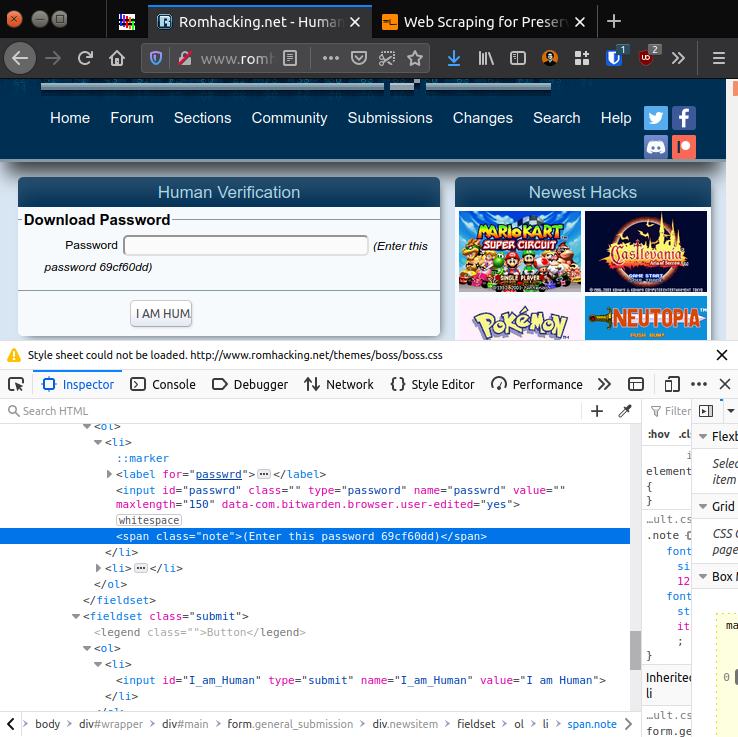
In the example above, I have found where the password is stored in the HTML source. It is inside a span
field with class=note as an attribute. Thus, retrieving the password with BeautifulSoup is as simple as
doing:
# Get the content of the span tag containing the password,
# take the last word and remove last ")" character.
password = soup.find('span',
attrs={'class': 'note'}).get_text().split(' ')[-1][:-1]
The same idea is generalized to extract the metadata of a ROM hack into a text file.
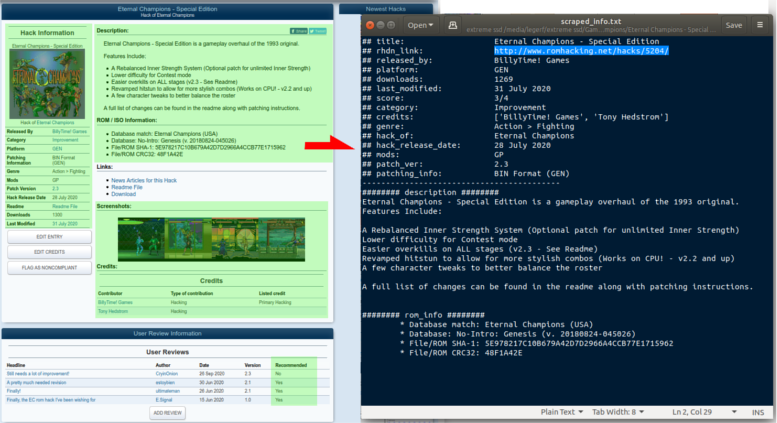
Mechanize
As for Mechanize, this is a library which I had not used previously. It is used to fill and submit PHP forms, such as the password CAPTCHA. I also used it to submit search queries to the website, since the links to the ROM hacks are not directly accessible in a text page for us to see (even more annoying, search results are limited to 200 results per page, and must be parsed).

The scraper in action
When all is said and done, here is a screenshot of the scraper in action:
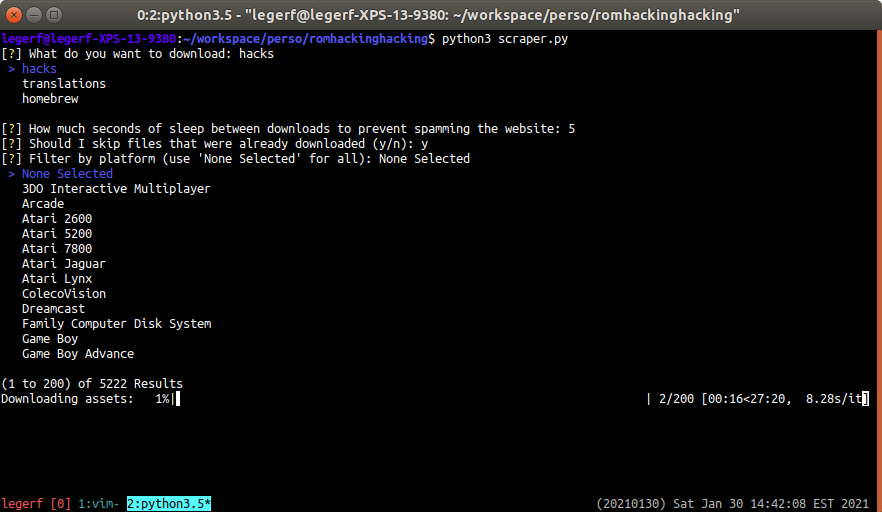
And here is what the download results look like:
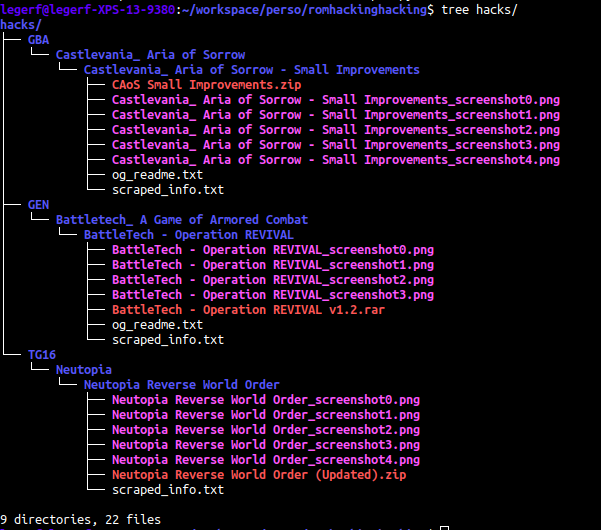
Downloading the RHDN archive
And here is the reason we are all here today. On January 19 2021, I have performed a complete backup of all the available ROM hacks on romhacking.net. Some hacks had their download links removed by their authors, which is a shame… But, for the most part, everything of note is here.
As long as my scraper is compatible with RHDN’s website (and weak CAPTCHA), I will do my best to keep backing up the site’s content for everyone’s benefit. I believe the work of the ROM hacking community must be preserved at all cost. Its history is part of gaming culture and should never be forgotten.
Source to my scraper (and some drama)
I might open source my scraper someday, but since this is fairly new and I want to keep a low profile to
limit the risk of DDoSing RHDN’s servers, I will keep it closed for now. If you want the source, send me a
message and I’ll give you access to my repository.
The wait is over! Eight months after finishing this project, I am finally ready to open the source code. Unfortunately, a few days after the code has been made public, security has been (slightly) upgraded on RHDN and made this scraper inefficient in its current form. You can the latest version here: https://gitlab.com/felleg/rhdn-scraper
Here is a timeline of how things unfolded:
- Jan 2021: First working version of the scraper and first archive made publicly available: https://archive.org/details/rhdn-20210119
- Sept 2021: Second archive made publicly available: https://archive.org/details/rhdn-20210914. Open sourced the scraper.
- Sept 23 2021: Contacted Nightcrawler of RHDN to let them know of the project and ask for their blessing.
- Sept 25 2021: Received negative response, website template modified to heighten security (downloads behind accounts).
- Sept 26 2021: Disabled scraper on master branch to prevent useless requests.
Closing comments
This was a wild ride for me. This is probably the biggest contribution I will do for retro gaming in my lifetime. It might not seem like much from some people’s point of view, but to me the project hit a sweet spot in terms of difficulty and public appeal. I am glad that my work got a positive response in the hacking community, but I am ecstatic that this catalog can finally be considered “saved”. The more people download the archive link I posted above, the more likely it is that these hacks will live forever.
I especially want to thank my friend Mathieu who helped me debug part of this project. I was having a tough time at fooling the CAPTCHA, and he noticed that RHDN’s servers require us to send a “Referer” value in the POST header to validate the download. Very strange, but I am glad that it was an easy fix. 😄
It saddens me that RHDN doesn’t seem to agree on the urgency of making bulk downloads like this available for archival purposes. As of this writing, the scraper has been de-activated and further developments have been halted. I hope they have a contingency plan in case something goes wrong with their servers or their administration. To my limited knowledge, such a plan has never been made public. I wish them the best of luck, for the sake of the community they have built over the years.
Some recommended ROM hacks and homebrews
If you are interested in retro gaming but have never tried ROM hacks, you are seriously missing out. Some of the best retro gaming goodness is to be found here, and has been created by die-hard fans for your enjoyment. To help you dive into this incredible catalog, here are some noteworthy ROM hacks or completely original homebrew software available for free, along with some of my personal favorites:
- Ultimate Mortal Kombat Trilogy: For people like me who grew up playing Mortal Kombat on the Sega Genesis, this hack is simply out of this world.
- Super Mario Bros. Two Players: The first time Nintendo allowed players to play Mario simultaneously was with New Super Mario Bros. Wii. This hack reveals that such a feat would have been possible on the original NES!
- Final Fantasy VII NES: Final Fantasy VII is a revolutionary PlayStation 1 RPG. This hack modifies the original Final Fantasy to create a port of FFVII for the NES. It is surprisingly faithful to the PS1 classic.
- Mario Adventure: A hack of Super Maro Bros. 3, often hailed as one of the greatest hacks of all time.
- Super Mario Bros. 3Mix: Another immensely successful Super Mario Bros. 3 hack, probably better than Mario Adventure.
- Sonic 3D Blast: Director’s Cuts: The original creator of Sonic 3D Blast went back and updated the game to more closely match his initial vision.
- Tetris Zero: Adds many features to Nintendo’s Tetris for the NES, including multiplayer
- Lawn Mower: Fun little homebrew game where you must mow the lawn before your lawnmower runs out of gas.
- Earthbound Halloween Hack: Made by Toby Fox, the creator of Undertale, this hack of Earthbound is interesting.
- Legend of Zelda and Super Metroid Crossover Randomizer: Mix Zelda and Super Metroid in a single randomized adventure. It’s great.
For more suggestions, have a look at this video from My Life in Gaming: Useful ROM Hacks for Retro Games - Restorations, Fan Translations, Colorizations
Finally, here are even more suggestions: Reddit’s ROM Hack best-of list
